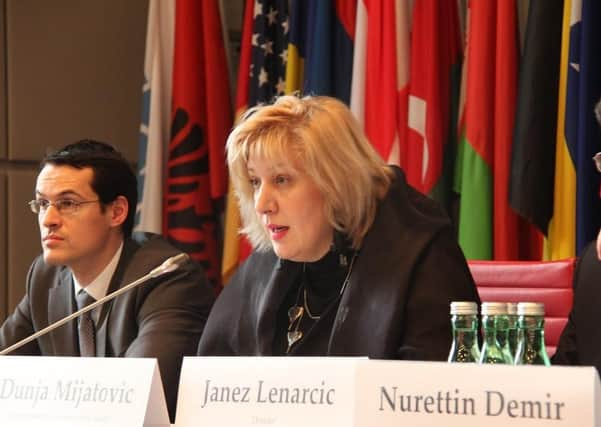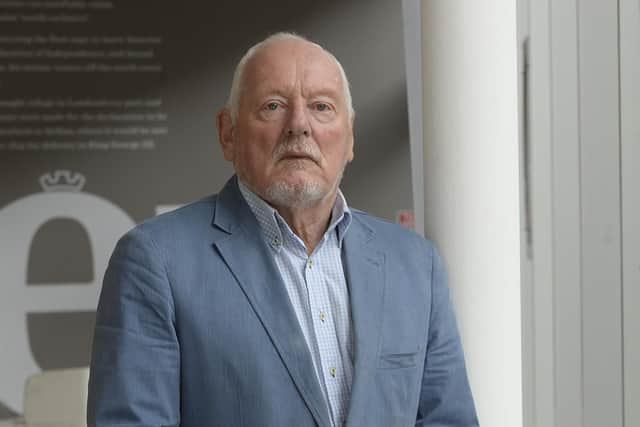Jeff Dudgeon to European human rights commissioner: You attack the UK for this amnesty but not for past ones that benefitted terrorists — why not?


Dear Dunja Mijatović,
I am convenor of the Malone House Group, a Northern Ireland NGO recognised at the Council of Europe which has submitted legal opinions on legacy to the Committee of Ministers in Strasbourg.
We deal with all the Articles in the Convention, not just 2 but the competing and neglected Articles 6, 8, 14 and 17.


Advertisement
Hide AdAdvertisement
Hide AdWe are a group of academics, historians and lawyers based in Belfast with a different point of view on legacy from that in the Northern Ireland universities and amongst practitioners, which are given most media coverage. This explains why you will not have heard of us.
I read of your recent intervention on legacy as the Council of Europe’s (COE) Human Rights Commissioner which merited a critical editorial in the News Letter (‘Yet another assault on the UK for its record in resisting past Irish terrorism,’ September 24, see link below).
You had sent a letter to the Secretary of State on his July proposals and referred to “work done by my Office over the last two decades, including ... discussions with several stakeholders in Northern Ireland, and a recent meeting with victims”.
Your observations addressed, “the proposed statute of limitations and its compliance with the UK’s international obligations; the pitting of criminal justice against truth and reconciliation; the ongoing delays in implementing commitments on legacy issues; and the lack of a victim-centred approach.”
Advertisement
Hide AdAdvertisement
Hide AdIn conclusion, you wrote, “If adopted, the plan would lead to impunity and cannot be the foundation on which transitional justice is built.”
Your frequent use of the phrase transitional justice (TJ) in your letter reveals a partial view, divorced from Strasbourg legacy judgments. To deploy that concept, reflects a radical approach more than a cognisance of the jurisprudence of the European Court of Human Rights (ECtHR).
It may be the governing outlook in our university law departments but it is not mainstream in Europe. Even in the development of its Article 2 procedural right, the Court does not consider Northern Ireland applications in TJ terms.
For your information, I won a case against the United Kingdom at the ECtHR in 1981. Indeed it was 40 years ago this month when the court obliged Westminster to decriminalise homosexual relations in Northern Ireland.
Advertisement
Hide AdAdvertisement
Hide AdI therefore acknowledge the convention’s value in terms of human rights and individual freedom but no longer as much when cases and interventions appear increasingly partisan.
From your biography, I notice you have a Bosnian Serb background which means you understand ethnic disputes and the different ways to try to solve them. These have by no means all been successful although they have included amnesties.
I was briefly in Bosnia and had interesting, and surprising, discussions with several, still Yugoslav-minded, Serbs there. Like me, they appreciated a broader political framework than ethnically-based states. That has been the value of the United Kingdom whose army and police prevented a civil war from 1969. Our conflict was none the less severe and, until the Bosnian war, the worst in Europe since 1945.
We appreciate the direction of travel of the UK government in its latest proposals on ending Troubles criminal investigations. Of course they are only the latest in a long line of amnesty arrangements since the 1998 Agreement.
I list them here to illustrate their extent:
Advertisement
Hide AdAdvertisement
Hide Ad• The Belfast Agreement released all paramilitary prisoners who had served two years in jail. They were the grossest of human rights abusers.
• It also did away with the RUC, a police force that experienced 300 dead (the equivalent in GB terms of 10,000 officers killed).
• On-the-Run (OTR) letters of comfort avoiding prosecution were provided, in secret, over fourteen years, to hundreds in the IRA, but only to loyal Republicans. OTR is a misnomer in that most of the letters were handed to individuals living openly in Northern Ireland.
• Numerous Royal Prerogative of Mercy pardons for convicted prisoners were secretly issued. Government says however most records have been lost.
Advertisement
Hide AdAdvertisement
Hide Ad• An amnesty, so described in the legislation, was provided in relation to forensic evidence obtained from decommissioned weapons.
• Evidence obtained from the bodies of the disappeared was prohibited from court use.
• Prosecution indemnities were provided for witnesses giving evidence at the Saville tribunal into Bloody Sunday and in a series of other public inquiries.
• Agreements were made in 1999 between Taoiseach Bertie Ahern and Tony Blair not to proceed with any future Troubles prosecutions or extraditions.
Advertisement
Hide AdAdvertisement
Hide Ad• The non-investigation into the colossal numbers of people involved in the 16,000 bombings and the 37,000 shootings of the Troubles which did not involve deaths is another amnesty. This affects some 50,000 people who were injured but not killed.
Given the oft-predicted paucity of future prosecutions, even by Jon Boutcher of Operation Kenova – and outside of army veterans – we are already close, to a full amnesty.
I am not aware of the COE condemning the 1998 prisoner release amnesty or any of these other later arrangements and ask, if not why not?
There are as you know contested views of what are international obligations regarding amnesties but they are certainly not subject to condemnation in such law.
Advertisement
Hide AdAdvertisement
Hide AdProfessor Brice Dickson, a former NI Human Rights Chief Commissioner, has recently written that the ECtHR’s Grand Chamber’s opinion on the (Croatian) Margus case, “strongly implies that if, for the purpose of promoting reconciliation and the ongoing peace process in Northern Ireland, a law were to be passed in the UK granting an amnesty for all killings carried out in connection with the troubles in Northern Ireland before (say) 1998, the European Court might hold that law to be a sufficient justification for the State’s refusal to prosecute and/or punish someone for a killing even though there had not been a thorough and effective investigation of that killing.”
The professor added, “It might not so hold, however, in a situation where the killing was part of ‘a grave breach of fundamental rights’, a term which the European Court has chosen not to define.” Significantly, the Overseas Operations Act 2021 that applies to army veterans does not affect allegations of sexual offences, torture, crimes against humanity, genocide or war crimes.
What ought to be of greatest concern to the Council of Europe is that since our peace process culminated in 1998 there have been 160 political murders, all extrajudicial, and not one caused by the army or police. Most are unpunished. We would welcome an intervention on that aspect.
Reconciliation is being impeded by legacy while lawfare prevents wounds healing. What is needed in the Council of Europe is a review of the court’s jurisprudence which, on amnesties and statutes of limitations is patchy and unclear, but not one-sided interventions. I would appreciate discussing the legacy question with you.
Regards
Jeff Dudgeon (Malone House Group Convenor), 6 October 2021
Advertisement
Hide AdAdvertisement
Hide AdOther opinion articles below and beneath that information on how to subscribe to the News Letter:
• Esmond Birine: The role of European Court in NI is an important matter, not just a legal technicality
• Ruth Dudley Edwards Oct 12: SF is the driving force in the Irish demonisation of Israel
Advertisement
Hide AdAdvertisement
Hide Ad• Owen Polley Oct 11: Stormont has repeatedly let down health workers by ducking reform
• Henry McDonald Oct 9: Colm Toibin spurns misty-eyed guff about a ‘New Ireland’
• Ben Lowry Oct 9: Echoes of 2019, as Boris Johnson fails to proclaim his unionism in speech
Advertisement
Hide AdAdvertisement
Hide Ad• Peter Robinson Oct 1: Doug Beattie should say to where he wants UUP voters to transfer
——— ———
A message from the Editor:
Thank you for reading this story on our website. While I have your attention, I also have an important request to make of you.
With the coronavirus lockdown having a major impact on many of our advertisers — and consequently the revenue we receive — we are more reliant than ever on you taking out a digital subscription.
Subscribe to newsletter.co.uk and enjoy unlimited access to the best Northern Ireland and UK news and information online and on our app. With a digital subscription, you can read more than 5 articles, see fewer ads, enjoy faster load times, and get access to exclusive newsletters and content. Visit https://www.newsletter.co.uk/subscriptions now to sign up.
Advertisement
Hide AdAdvertisement
Hide AdOur journalism costs money and we rely on advertising, print and digital revenues to help to support them. By supporting us, we are able to support you in providing trusted, fact-checked content for this website.
Ben Lowry
Editor